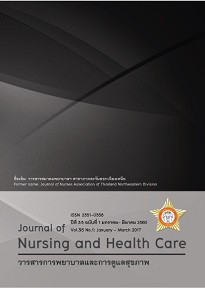ผลของโปรแกรมการสร้างเสริมการรับรู้สมรรถนะของตนเองต่อผลลัพธ์ด้านสุขภาพของผู้ป่วยโรคความดันโลหิตสูงในจังหวัดเชียงราย ประเทศไทย Effects of Self - Efficacy Enhancement Program on Health Outcomes of People Living with Hypertension Residing in Chiang Rai Prov
คำสำคัญ:
ความดันโลหิตสูง โปรแกรมการสร้างเสริมการรับรู้สมรรถนะของตนเอง พฤติกรรมการดูแลสุขภาพ hypertension, self-efficacy enhancement program, and health behaviorsบทคัดย่อ
บทคัดย่อ
การวิจัยกึ่งทดลองแบบ 2 กลุ่ม วัดก่อนและหลังการทดลอง นี้ มีวัตถุประสงค์เพื่อศึกษาผลของโปรแกรมการสร้างเสริมการรับรู้สมรรถนะของตนเองต่อผลลัพธ์ด้านสุขภาพประกอบด้วย การรับรู้สมรรถนะของตนเอง พฤติกรรมการดูแลสุขภาพ 6 ด้าน และระดับความดันโลหิต ของผู้ป่วยโรคความดันโลหิตสูงในจังหวัดเชียงราย กลุ่มตัวอย่างเป็นผู้ป่วยโรคความดันโลหิตสูง อายุ 35-59 ปี ที่ได้รับการวินัจฉัยโรคอย่างน้อย 6 เดือน และรับประทานยารักษาโรคความดันโลหิตสูงอย่างน้อย 1 ชนิด อาศัยในพื้นที่ในความรับผิดชอบของโรงพยาบาลส่งเสริมสุขภาพตำบล 2 แห่ง กลุ่มทดลองและกลุ่มควบคุมกลุ่มละ 32 คนถูกคัดเลือกแบบเจาะจงโดยจับคู่ตามอายุ เพศ ระยะเวลาที่เป็นโรคและระดับความดันโลหิต กลุ่มทดลองได้รับโปรแกรมการสร้างเสริมการรับรู้สมรรถนะของตนเองที่พัฒนาขึ้นตามแนวคิดของแบนดูรา เป็นเวลา 12 สัปดาห์ ประกอบด้วย การบรรยาย การสนทนากลุ่ม การแลกเปลี่ยนเรียนรู้ การสาธิตและสาธิตย้อนกลับ การกำกับติดตามพฤติกรรมการดูแลสุขภาพของตนเองและการให้ข้อมูลระดับความดันโลหิต กลุ่มควบคุมได้รับการดูแลตามปกติและมาตรวจตามนัด ก่อนและหลังการศึกษา ทั้งสองกลุ่มได้รับการประเมินการรับรู้สมรรถนะของตนเองและพฤติกรรมการดูแลสุขภาพโดยใช้แบบสอบถามและวัดความดันโลหิต วิเคราะห์ข้อมูลด้วยสถิติพรรณนา c2, Fisher’s exact test, paired t-test และ independent t-test
ผลการวิจัย พบว่า หลังได้รับโปรแกรมการสร้างเสริมการรับรู้สมรรถนะของตนเอง คะแนนการรับรู้สมรรถนะของตนเองและพฤติกรรมการดูแลสุขภาพ สูงกว่าก่อนการได้รับโปรแกรม อย่างมีนัยสำคัญทางสถิติ (t=17.09 และ 6.11,p <.05) และระดับความดันโลหิตซิสทอลิกและไดแอสทอลิกต่ำกว่าก่อนการได้รับโปรแกรม อย่างมีนัยสำคัญทางสถิติ (t=-2.43 และ -2.08, p<.05) และพบว่า การรับรู้สมรรถนะของตนเองและพฤติกรรมการดูแลสุขภาพของกลุ่มทดลองสูงกว่ากลุ่มควบคุมอย่างมีนัยสำคัญทางสถิติ (t=12.05 และ 11.74, p<.05) และระดับความดันโลหิตซิสทอลิกและไดแอสทอลิกของกลุ่มทดลองต่ำกว่ากลุ่มควบคุมอย่างมีนัยสำคัญทางสถิติ (t=-2.05 และ -2.74, p<.05) ผลการวิจัยแสดงให้เห็นว่าโปรแกรมการสร้างเสริมการรับรู้สมรรถนะของตนเองช่วยให้พฤติกรรมการดูแลสุขภาพของผู้ป่วยโรคความดันโลหิตสูงเหมาะสมกับโรคมากขึ้นและส่งผลให้ระดับความดันโลหิตลดลง
Abstract
This two group pretest-posttest quasi-experimental study proposed to examine the effect of a Self-Efficacy Enhancement program on health outcomes which include perceived self-efficacy, six health behaviors and blood pressure of people living with hypertension in Chiang Rai province, Thailand. Subjects were 35-59 years of age, at least 6 month diagnosed with hypertension, and used at least 1 prescribed hypertensive medication. Thirty two subjects in experimental group and 32 subjects in control group from different primary health care centers were recruited through purposive sampling and paired matched by age, gender, and blood pressure. Subjects in experimental group received the 12-week Bandura's Self-Efficacy Enhancement program consisted of health education and consultation, discussion and experience sharing within small groups, demonstration and return demonstration of health behavior skills related to hypertension, monitoring own health behavior, and provision of compliments. Subjects in control group received routine care consisted of group health education and follow up reminding on their follow up visit from nurses. Data were collected using perceived self-efficacy and health behavior questionnaires and blood pressure were recorded at pre and post program. Data analysis was conducted using descriptive statistics, c2, Fisher’s exact test, paired t-test และ independent t-test.
Results revealed that, after receiving a Self - Efficacy Enhancement program, perceived self-efficacy and health behaviors were statistically significantly better than before receiving the program (t=17.09 and 6.11, p <.05) and systolic and diastolic blood pressures were statistically significantly lower than before receiving the program (t=-2.43 and -2.08, p<.05). Perceived self-efficacy and health behaviors of subjects in experimental group were statistically significantly better than that of control group (t=12.05 and 11.74, p<.05) and systolic and diastolic blood pressures were statistically significantly lower than that of control group (t=-2.05 and -2.74, p<.05)
The Self - Efficacy Enhancement program is evident to modify health behaviors related to hypertension and lower blood pressure in people living hypertension.



